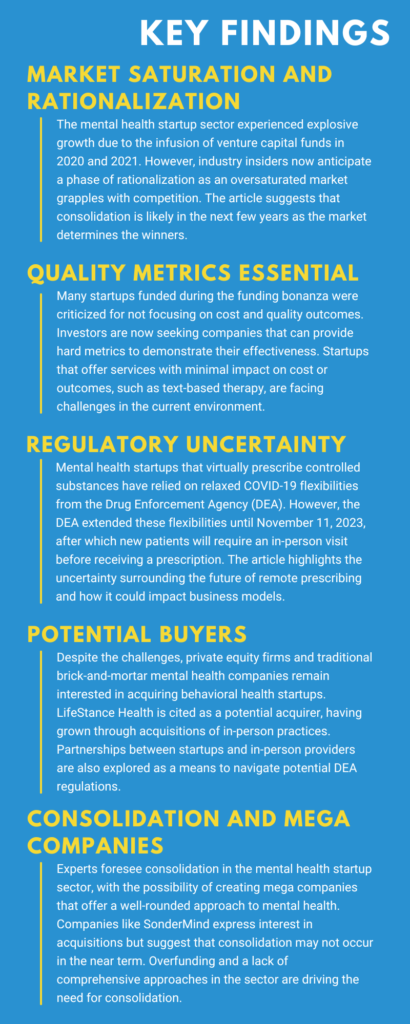The mental health startup industry, fueled by nearly $5 billion in venture capital funding in 2021, is now facing potential mergers and acquisitions as challenges arise. Factors include high interest rates, market saturation, and potential regulatory changes, particularly regarding remote prescribing. The uncertain future of virtual prescribing of controlled substances, which relied on relaxed COVID-19 rules, adds to the uncertainty. Private equity firms, brick-and-mortar mental health companies, and potential consolidation among virtual health companies are among the strategies to adapt to the changing landscape.
Analysis
The article discusses the changing landscape of the mental health startup industry, two years after a significant influx of venture capital funding. In 2021, nearly $5 billion was invested in behavioral health startups, leading to the emergence of numerous companies offering various mental health services, including remote therapy and medication prescription.
“The market is largely focused on how the DEA rules impact their business model,” shared Nathaniel Weiner, behavioral health law co-chair at law firm Polsinelli. “Are they going to be on the right side or wrong side? If their business model is optimized for the regulatory requirements, they can just continue merrily on their way. Or is it going to be an issue where they’ve built their whole model on something that can’t be done anymore?”
Several factors have altered the trajectory of these startups, including rising interest rates, market saturation, and potential regulatory changes affecting remote prescribing.
Key Findings
This analysis will delve into the key findings of the article and conclude with insights into the future of mental health startups:

The mental health startup landscape, which saw significant investment in 2020 and 2021, is now facing challenges due to market saturation, regulatory uncertainties, and increased scrutiny on quality outcomes. As the market matures, it is likely that some startups will seek mergers or acquisitions to navigate these challenges. Private equity firms and traditional mental health providers are potential buyers, while partnerships with in-person providers could help startups adapt to changing regulations.
Furthermore, the sector may witness a consolidation of startups into larger, more comprehensive mental health companies to address the shortcomings of one-dimensional approaches. While the mental health startup industry has evolved rapidly, the next few years are expected to be crucial in determining which companies can sustain themselves in the changing landscape and which will seek exit strategies.
Sources: https://www.modernhealthcare.com/digital-health/mental-health-startups-private-equity

